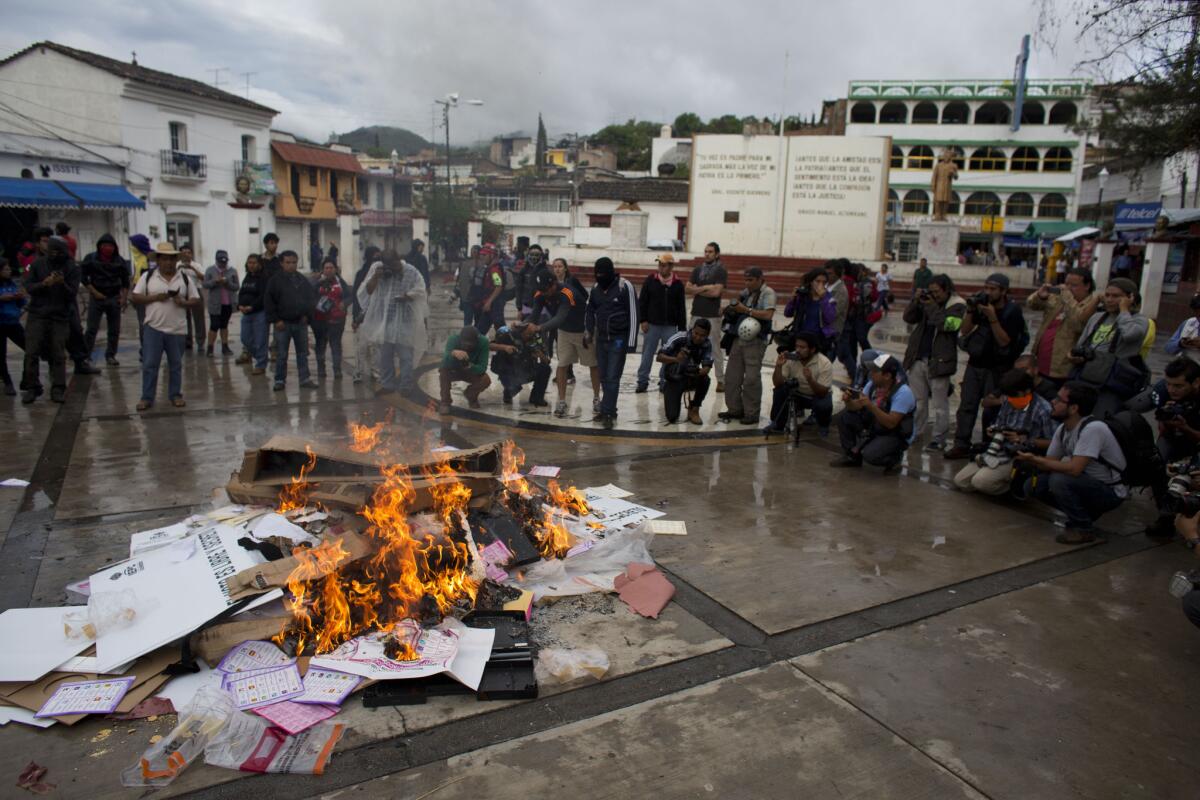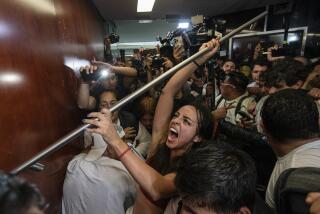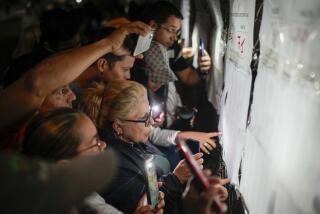Anger runs high as Mexicans vote: ‘So many parties. Not much choice’

Journalists take pictures as ballots and other election materials burn in the main square of Tixtla, Mexico, during a protest on June 7.
Amid torched ballot boxes and deep public anger, Mexicans voted Sunday for governors, Congress members and other officials in a midterm election expected to hand more power to the ruling party despite widespread discontent.
But for the first time in modern Mexican history, a candidate not affiliated with a political party stood a chance of winning. Jaime “El Bronco” Rodriguez was running for governor of the wealthy border state of Nuevo Leon thanks to new election rules that allow independent candidacies.
Two exit polls gave him the victory. If that holds true, voters will have sent a clear message to the status quo, saying that no party satisfies the public’s demands, analysts said.
“I am coming to vote with the hopes of a major change, although I know what I’m asking for is a miracle,” said Mexico City dentist Jesus Torres, 42.
“Why vote?” said Jorge Morales, a Mexico City resident who despite his attitude was going to cast a ballot. “They are all the same. So many parties. Not much choice.”
Gloria Perez Bonilla, a 20-year-old student, said she planned to invalidate her ballot in protest.
“It is a shame to have to vote without emotion, without passion for a party,” she said. “I will annul my vote to tell the politicians that we are tired of them.”
Perez was part of a movement to boycott or invalidate ballots cast in the election, which will choose nine governors, 16 state legislatures, 500 members of the federal Congress and 887 mayors.
Several voters said they had been given money or gifts to vote for one party or another.
In the southern, largely indigenous state of Oaxaca, tension was so high that international election monitors decided not to show up. Incidents including the burning of ballot boxes and blocking of entryways to polling stations were reported in Oaxaca, Guerrero and Michoacan states, home to about 8.3 million voters.
In one Guerrero city, Tixtla, the election was canceled altogether because of attacks on the voting booths. Protesters included a radical teachers union and supporters of 43 college students kidnapped nearby and apparently killed last year by drug traffickers working with local officials.
Later, election officials said the vote in Tixtla had resumed after residents armed with sticks insisted on voting.
President Enrique Peña Nieto’s Institutional Revolutionary Party, or PRI stands to gain the most, according to preelection polls. After casting his ballot Sunday, Peña Nieto said violence was limited to isolated incidents.
The president’s approval ratings have tanked, thanks in part to a sluggish economy, corruption scandals, flagging reforms and several suspicious mass killings attributed to authorities, including the 43 college students.
However, abstention and voided ballots, while a potent symbol of public protest, in the end will only help the PRI and other well-organized groups, which will always turn out a party’s core voters at the polls.
“The elections are not a plebiscite on the Peña Nieto government,” writer Jorge Zepeda Patterson said on the SinEmbargo news website. “The president’s party has not done well, but the opposition has done the same or worse.”
Thousands of police and army troops were deployed in many parts of the country to protect voting stations.
Lorenzo Cordova, president of the National Electoral Institute, who oversees elections, said the voting stations that could not open Sunday represented the tiniest of percentages. Cordova recently came under intense criticism when he was secretly recorded making fun of indigenous leaders, many of whom hail from Oaxaca.
“Our system is working correctly,” Cordova said in a nationally broadcast address.
Sanchez is a news assistant in The Times’ Mexico City bureau.
Follow @TracyKWilkinson on Twitter for more news from Latin America.
More to Read
Sign up for Essential California
The most important California stories and recommendations in your inbox every morning.
You may occasionally receive promotional content from the Los Angeles Times.










